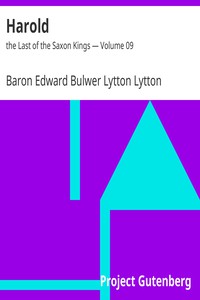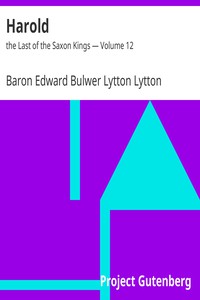Harold : the Last of the Saxon Kings — Complete, Lytton [best e reader for academics .txt] 📗

- Author: Lytton
Book online «Harold : the Last of the Saxon Kings — Complete, Lytton [best e reader for academics .txt] 📗». Author Lytton
“Not in thine only, son of Sweyn, but in those of fate; for before thy coming I prayed against the long blind yearning of my heart, prayed that Wolnoth might not cross the sea with his kinsmen.”
“How!” exclaimed the Earl, astonished.
Githa took his arm, and led him to the farther end of the ample chamber, as if out of the hearing of Haco, who turned his face towards the fire, and gazed into the fierce blaze with musing, unwinking eyes.
“Couldst thou think, Harold, that in thy journey, that on the errand of so great fear and hope, I could sit brooding in my chair, and count the stitches on the tremulous hangings? No; day by day have I sought the lore of Hilda, and at night I have watched with her by the fount, and the elm, and the tomb; and I know that thou hast gone through dire peril; the prison, the war, and the snare; and I know also, that his Fylgia hath saved the life of my Wolnoth; for had he returned to his native land, he had returned but to a bloody grave!”
“Says Hilda this?” said the Earl, thoughtfully.
“So say the Vala, the rune, and the Scin-laeca! and such is the doom that now darkens the brow of Haco! Seest thou not that the hand of death is in the hush of the smileless lip, and the glance of the unjoyous eye?”
“Nay, it is but the thought born to captive youth, and nurtured in solitary dreams. Thou hast seen Hilda?—and Edith, my mother? Edith is—”
“Well,” said Githa, kindly, for she sympathised with that love which Godwin would have condemned, “though she grieved deeply after thy departure, and would sit for hours gazing into space, and moaning. But even ere Hilda divined thy safe return, Edith knew it; I was beside her at the time; she started up, and cried, ‘Harold is in England!’—‘How?—Why thinkest thou so?’ said I. And Edith answered, ‘I feel it by the touch of the earth, by the breath of the air.’ This is more than love, Harold. I knew two twins who had the same instinct of each other’s comings and goings, and were present each to each even when absent: Edith is twin to my soul. Thou goest to her now, Harold: thou wilt find there thy sister Thyra. The child hath drooped of late, and I besought Hilda to revive her, with herb and charm. Thou wilt come back, ere thou departest to aid Tostig, thy brother, and tell me how Hilda hath prospered with my ailing child?”
“I will, my mother. Be cheered!—Hilda is a skilful nurse. And now bless thee, that thou hast not reproached me that my mission failed to fulfil my promise. Welcome even our kinswoman’s sayings, sith they comfort thee for the loss of thy darling!”
Then Harold left the room, mounted his steed, and rode through the town towards the bridge. He was compelled to ride slowly through the streets, for he was recognised; and cheapman and mechanic rushed from house and from stall to hail the Man of the Land and the Time.
“All is safe now in England, for Harold is come back!” They seemed joyous as the children of the mariner, when, with wet garments, he struggles to shore through the storm. And kind and loving were Harold’s looks and brief words, as he rode with vailed bonnet through the swarming streets.
At length he cleared the town and the bridge; and the yellowing boughs of the orchards drooped over the road towards the Roman home, when, as he spurred his steed, he heard behind him hoofs as in pursuit, looked back, and beheld Haco. He drew rein,—“What wantest thou, my nephew?”
“Thee!” answered Haco, briefly, as he gained his side. “Thy companionship.”
“Thanks, Haco; but I pray thee to stay in my mother’s house, for I would fain ride alone.”
“Spurn me not from thee, Harold! This England is to me the land of the stranger; in thy mother’s house I feel but the more the orphan. Henceforth I have devoted to thee my life! And my life my dead and dread father hath left to thee, as a doom or a blessing; wherefore cleave I to thy side;—cleave we in life and in death to each other!”
An undefined and cheerless thrill shot through the Earl’s heart as the youth spoke thus; and the remembrance that Haco’s counsel had first induced him to abandon his natural hardy and gallant manhood, meet wile by wile, and thus suddenly entangle him in his own meshes, had already mingled an inexpressible bitterness with his pity and affection for his brother’s son. But, struggling against that uneasy sentiment, as unjust towards one to whose counsel—however sinister, and now repented—he probably owed, at least, his safety and deliverance, he replied gently:
“I accept thy trust and thy love, Haco! Ride with me, then; but pardon a dull comrade, for when the soul communes with itself the lip is silent.”
“True,” said Haco, “and I am no babbler. Three things are ever silent: Thought, Destiny, and the Grave.”
Each then, pursuing his own fancies, rode on fast, and side by side; the long shadows of declining day struggling with a sky of unusual brightness, and thrown from the dim forest trees and the distant hillocks. Alternately through shade and through light rode they on; the bulls gazing on them from holt and glade, and the boom of the bittern sounding in its peculiar mournfulness of toile as it rose from the dank pools that glistened in the western sun.
It was always by the rear of the house, where stood the ruined temple, so associated with the romance of his life, that Harold approached the home of the Vala; and as now the hillock, with its melancholy diadem of stones, came in view, Haco for the first time broke the silence.
“Again—as in a dream!” he said, abruptly. “Hill, ruin, grave-mound—but where the tall image of the mighty one?”
“Hast thou then seen this spot before?” asked the Earl.
“Yea, as an infant here was I led by my father Sweyn; here too, from thy house yonder, dim seen through the fading leaves, on the eve before I left this land for the Norman, here did I wander alone; and there, by that altar, did the great Vala of the North chaunt her runes for my future.”
“Alas! thou too!” murmured Harold; and then he asked aloud, “What said she?”
“That thy life and mine crossed each other in the skein; that I should save thee from a great peril, and share with thee a greater.”
“Ah, youth,” answered Harold, bitterly, “these vain prophecies of human wit guard the soul from no anger. They mislead us by riddles which our hot hearts interpret according to their own desires. Keep thou fast to youth’s simple wisdom, and trust only to the pure spirit and the watchful God.”
He suppressed a groan as he spoke, and springing from his steed, which he left loose, advanced up the hill. When he had gained





Comments (0)